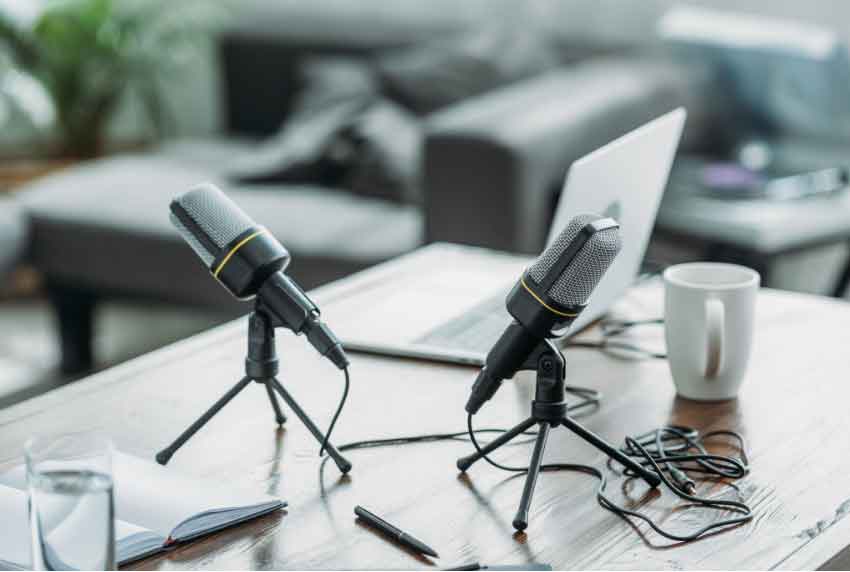Show:
Should My Small Business Start a Podcast?
Content can be one of the best marketing tools a small business has. Blogs, magazine articles, tutorials and other content are all great ways to draw in new traffic. They also provide visitors with value, encouraging them to investigate your brand further.
You can also do a lot more than just written content. A growing number of businesses are starting to launch podcasts. They’re taking advantage of the wealth of knowledge that they have to offer insightful discussions to potential customers and others that work in their work.

A podcast, however, can be a serious investment, especially if you want high-quality audio and great editing.
These are five questions that every small business owner or marketer should ask themselves before launching a podcast.
1. What Will You Talk About?
Everyone has a story to tell, and with the right framing, that story can make for interesting and engaging podcast material. However, you may find that it’s hard to square what you know, what you want to talk about and what your audience may be interested in.
In the same way that new writers are advised to “write what they know,” you can try sticking to your area of expertise. Listeners will appreciate the insights you can offer as a small business owner or expert in your field.
You may also bring on others to help you round out your knowledge base. Co-workers and industry contacts can both make great podcast guests. Great guests can help you create a better and more interesting experience for listeners.
2. Who Will Speak on Your Podcast?
When it comes to who will be on your podcast, you have options — including yourself, your team and business contacts who may be interested in joining you.
Before you invite a guest on your podcast, make sure that they know what they’re getting involved in.
Interviews can last anywhere between 10 minutes and a few hours. Recording a podcast is more complicated than just talking, even if your podcast style is pretty conversational or off-the-cuff.
You and your partners will still need to plan out episodes, choosing topics that are most likely to be relevant to your audience and identifying who among you is the best for a particular episode.
You’ll also need to prepare to schedule these guests, and prepare for rejection — not everyone will have the time or desire to speak on your podcast.

3. How Will You Produce and Master Your Podcast?
Podcast mastering is a post-production process in which certain adjustments are made to your audio to give it a more polished and professional sound.
Is post-production necessary? Not technically. However, it can give your podcast a really professional sound and make it much more listenable.
If you want to master your podcast on your own, you definitely can. This is especially true if you have experience producing and mastering audio.
However, there may be a bit of a learning curve.
If you want to tackle mastering your podcast on your own, you should learn the basics of audio mastering and start to experiment with audio mastering tools.
You should also learn how to master your podcast for different platforms. Spotify and Amazon Music, for example, have different normalization levels, -13 to -15 on Spotify and -9 on Amazon Music. If an episode’s loudness exceeds those levels, then the platform will compress it, impacting how your podcast sounds.
Prepping your podcast based on the streaming platforms you will use will be an important step if you want to handle production and mastering in-house.
4. How Much Time Do You Have?
“Podcast” is a broad term, and the category can include anything from a minute-long Instagram explainer to an in-depth, multi-hour deep dive on a particular topic.
Before deciding what kind of podcast you want to run, you should take stock of how much time you have. You should also ask your co-hosts and guests how much time they have.
This information will help you make sure that you’re not biting off more than you can chew. While you may want to do a complex and intricate podcast, or speak for hours with a guest, you might not have the time needed. Instead, you’ll have to find a more reasonable format.
Remember, however, that a podcast requires more labor than just recording. You’ll also need to plan each episode, coordinate your guests and co-hosts, then stake out some time or money for editing.
How long will this all take on average? It depends. The hosts of Podcast Byte, a podcast about podcasting, say that creating each episode can take upwards of 6 hours, depending on the length of the episode.
Your own results are likely to vary. It’s a good idea to start small, with an episode here or there, to learn what pace you’ll work at, and how long your episodes will take to create and master.

5. How Long Will the Podcast Be?
Or, how many episodes will you make? Do you want to keep doing this forever, or limit it to a .. . span of a week or a month?
There’s no wrong answers. A long-term commitment, however, may be hard to sustain. If you decide to start with a single episode or two, you can use that experience to know how much effort podcasting will take. Then, you can move on to more serious commitments as possible, generating podcast series and longer interviews.
What Small Business Owners Need to Know About Podcasts
Podcasts can be extremely valuable for small businesses, especially those that want to build a strong content marketing strategy. However, creating a podcast is no small undertaking — planning, preparation, recording and mastering will all take some work.
Fortunately, getting started can be simple and it’s possible for most business owners to work their way towards more demanding podcast projects. These five questions are a great way to guide your journey if you decide to get started with podcasting.
Eleanor Hecks is editor-in-chief at Designerly Magazine. She was the creative director at a digital marketing agency before becoming a full-time freelance designer. Eleanor lives in Philadelphia with her husband and pup, Bear.

 Return to Previous Page
Return to Previous Page








